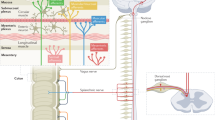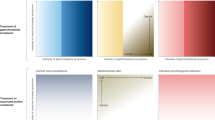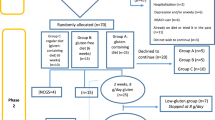Abstract
Patients with IBD who are apparently in remission—as indicated by normal blood tests, endoscopic findings and ultrasonography results—often continue to experience symptoms. Furthermore, despite these negative findings, there is a temptation to increase their anti-inflammatory medication in the hope that this approach would lead to some improvement. However, this strategy often seems to fail and can sometimes lead to adverse events. Consequently, when evidence of continuing inflammatory activity is lacking it might be appropriate to consider the possibility of co-existent IBS in these patients and to treat them for this condition. Dietary manipulation, antispasmodic agents, antidepressants (especially of the tricyclic variety) and even behavioural treatments might result in a worthwhile improvement of symptoms.
This is a preview of subscription content, access via your institution
Access options
Subscribe to this journal
Receive 12 print issues and online access
$209.00 per year
only $17.42 per issue
Buy this article
- Purchase on Springer Link
- Instant access to full article PDF
Prices may be subject to local taxes which are calculated during checkout
Similar content being viewed by others
References
Whorwell, P. J., McCallum, M., Creed, F. H. & Roberts, C. T. Non-colonic features of irritable bowel syndrome. Gut 27, 37–40 (1986).
Maxton, D. G., Morris, J. & Whorwell, P. J. More accurate diagnosis of irritable bowel syndrome by the use of 'non-colonic' symptomatology. Gut 32, 784–786 (1991).
Hungin, A. P., Chang, L., Locke, G. R., Dennis, E. H. & Barghout, V. Irritable bowel syndrome in the United States: prevalence, symptom patterns and impact. Aliment. Pharmacol. Ther. 21, 1365–1375 (2005).
Isgar, B., Harman, M., Kaye, M. D. & Whorwell, P. J. Symptoms of irritable bowel syndrome in ulcerative colitis in remission. Gut 24, 190–192 (1983).
Farrokhyar, F., Marshall, J. K., Easterbrook, B. & Irvine, E. J. Functional gastrointestinal disorders and mood disorders in patients with inactive inflammatory bowel disease: prevalence and impact on health. Inflamm. Bowel Dis. 12, 38–46 (2006).
Simren, M. et al. Quality of life in inflammatory bowel disease in remission: the impact of IBS-like symptoms and associated psychological factors. Am. J. Gastroenterol. 97, 389–396 (2002).
Keohane, J. et al. Irritable bowel syndrome-type symptoms in patients with inflammatory bowel disease: a real association or reflection of occult inflammation? Am. J. Gastroenterol. 105, 1789–1794 (2010).
Minderhoud, I. M., Oldenburg, B., Wismeijer, J. A., van Berge Henegouwen, G. P. & Smout, A. J. IBS-like symptoms in patients with inflammatory bowel disease in remission; relationships with quality of life and coping behavior. Dig. Dis. Sci. 49, 469–474 (2004).
Ansari, R. et al. Ulcerative colitis and irritable bowel syndrome: relationships with quality of life. Eur. J. Gastroenterol. Hepatol. 20, 46–50 (2008).
Piche, T. et al. Impact of functional bowel symptoms on quality of life and fatigue in quiescent Crohn disease and irritable bowel syndrome. Neurogastroenterol. Motil. 22, 626–e174 (2010).
Long, M. D. & Drossman, D. A. Inflammatory bowel disease, irritable bowel syndrome, or what?: A challenge to the functional-organic dichotomy. Am. J. Gastroenterol. 105, 1796–1798 (2010).
Wouters, M. M. & Boeckxstaens, G. E. Neuroimmune mechanisms in functional bowel disorders. Neth. J. Med. 69, 55–61 (2011).
Swan, C. et al. Identifying and testing candidate genetic polymorphisms in the irritable bowel syndrome (IBS): association with TNFSF15 and TNFα. Gut http://dx.doi.org/10.1136/gutjnl-2011-301213.
Salonen, A., de Vos, W. M. & Palva, A. Gastrointestinal microbiota in irritable bowel syndrome: present state and perspectives. Microbiology 156, 3205–3215 (2010).
Carroll, I. M., Ringel-Kulka, T., Siddle, J. P. & Ringel, Y. Alterations in composition and diversity of the intestinal microbiota in patients with diarrhea-predominant irritable bowel syndrome. Neurogastroenterol. Motil. 24, 521–e248 (2012).
Nagalingam, N. A. & Lynch, S. V. Role of the microbiota in inflammatory bowel diseases. Inflamm. Bowel Dis. 18, 968–984 (2012).
Collins, S. M. & Bercik, P. The relationship between intestinal microbiota and the central nervous system in normal gastrointestinal function and disease. Gastroenterology 136, 2003–2014 (2009).
Zhou, Q., Zhang, B. & Verne, G. N. Intestinal membrane permeability and hypersensitivity in the irritable bowel syndrome. Pain 146, 41–46 (2009).
Spiller, R. C. Overlap between irritable bowel syndrome and inflammatory bowel disease. Dig. Dis. 27 (Suppl. 1), 48–54 (2009).
Vanner, S. J. et al. Predictive value of the Rome criteria for diagnosing the irritable bowel syndrome. Am. J. Gastroenterol. 94, 2912–2917 (1999).
Ishihara, S. et al. Prevalence of organic colonic lesions in patients meeting Rome III criteria for diagnosis of IBS: a prospective multi-center study utilizing colonoscopy. J. Gastroenterol. http://dx.doi.org/10.1007/s00535-012-0573-4.
Jellema, P., van der Windt, D. A., Schellevis, F. G. & van der Horst, H. E. Systematic review: accuracy of symptom-based criteria for diagnosis of irritable bowel syndrome in primary care. Aliment. Pharmacol. Ther. 30, 695–706 (2009).
Ladabaum, U. et al. Diagnosis, comorbidities, and management of irritable bowel syndrome in patients in a large health maintenance organization. Cl in. Gastroenterol. Hepatol. 10, 37–45 (2012).
Camilleri, M. Managing symptoms of irritable bowel syndrome in patients with inflammatory bowel disease. Gut 60, 425–428 (2011).
Kurien, M. et al. Bile acid malabsorption: an under-investigated differential diagnosis in patients presenting with diarrhea predominant irritable bowel syndrome type symptoms. Scand. J. Gastroenterol. 46, 818–822 (2011).
Judd, T. A., Day, A. S., Lemberg, D. A., Turner, D. & Leach, S. T. Update of fecal markers of inflammation in inflammatory bowel disease. J. Gastroenterol. Hepatol. 26, 1493–1499 (2011).
Otten, C. M. et al. Diagnostic performance of rapid tests for detection of fecal calprotectin and lactoferrin and their ability to discriminate inflammatory from irritable bowel syndrome. Clin. Chem. Lab. Med. 46, 1275–1280 (2008).
Burri, E. & Beglinger, C. Faecal calprotectin—a useful tool in the management of inflammatory bowel disease. Swiss. Med. Wkly 142, w13557 (2012).
Ohman, L., Stridsberg, M., Isaksson, S., Jerlstad, P. & Simren, M. Altered levels of fecal chromogranins and secretogranins in IBS: relevance for pathophysiology and symptoms? Am. J. Gastroenterol. 107, 440–447 (2012).
Agrawal, A. & Whorwell, P. J. Review article: abdominal bloating and distension in functional gastrointestinal disorders--epidemiology and exploration of possible mechanisms. Aliment. Pharmacol. Ther. 27, 2–10 (2008).
Zimmerman, J. Extraintestinal symptoms in irritable bowel syndrome and inflammatory bowel diseases: nature, severity, and relationship to gastrointestinal symptoms. Dig. Dis. Sci. 48, 743–749 (2003).
Francis, C. Y. & Whorwell, P. J. Bran and irritable bowel syndrome: time for reappraisal. Lancet 344, 39–40 (1994).
Galvez, J., Rodriguez-Cabezas, M. E. & Zarzuelo, A. Effects of dietary fiber on inflammatory bowel disease. Mol. Nutr. Food. Res. 49, 601–608 (2005).
Gibson, P. R. Food intolerance in functional bowel disorders. J. Gastroenterol. Hepatol. 26 (Suppl. 3), 128–131 (2011).
Gibson, P. R. & Shepherd, S. J. Personal view: food for thought--western lifestyle and susceptibility to Crohn's disease. The FODMAP hypothesis. Aliment. Pharmacol. Ther. 21, 1399–1409 (2005).
Whorwell, P. J. Do probiotics improve symptoms in patients with irritable bowel syndrome? Therap. Adv. Gastroenterol. 2, 37–44 (2009).
Rolfe, V. E., Fortun, P. J., Hawkey, C. J. & Bath-Hextall, F. Probiotics for maintenance of remission in Crohn's disease. Cochrane Database of Systematic Reviews 2006, Issue 4. Art. No.: CD004826 http://dx.doi.org/10.1002/14651858.CD004826.pub2.
Sang, L. X. et al. Remission induction and maintenance effect of probiotics on ulcerative colitis: a meta-analysis. World J. Gastroenterol. 16, 1908–1915 (2010).
Poynard, T., Regimbeau, C. & Benhamou, Y. Meta-analysis of smooth muscle relaxants in the treatment of irritable bowel syndrome. Aliment. Pharmacol. Ther. 15, 355–361 (2001).
Whorwell, P. J. & Isaacson, P. Toxic dilatation of colon in Crohn's disease. Lancet 2, 1334–1337 (1981).
Mowat, C. et al. Guidelines for the management of inflammatory bowel disease in adults. Gut 60, 571–607 (2011).
Jackson, J. L. et al. Treatment of functional gastrointestinal disorders with antidepressant medications: a meta-analysis. Am. J. Med. 108, 65–72 (2000).
Pimentel, M. et al. Rifaximin therapy for patients with irritable bowel syndrome without constipation. N. Engl. J. Med. 364, 22–32 (2011).
Menees, S. B., Maneerattannaporn, M., Kim, H. M. & Chey, W. D. The efficacy and safety of rifaximin for the irritable bowel syndrome: a systematic review and meta-analysis. Am. J. Gastroenterol. 107, 28–35 (2012).
Simren, M. et al. Intestinal microbiota in functional bowel disorders: a Rome foundation report. Gut http://dx.doi.org/10.1136/gutjnl-2012-302167.
Mencarelli, A. et al. Inhibition of NF-kappaB by a PXR-dependent pathway mediates counter-regulatory activities of rifaximin on innate immunity in intestinal epithelial cells. Eur. J. Pharmacol. 668, 317–324 (2011).
Ford, A. C., Talley, N. J., Schoenfeld, P. S., Quigley, E. M. & Moayyedi, P. Efficacy of antidepressants and psychological therapies in irritable bowel syndrome: systematic review and meta-analysis. Gut 58, 367–378 (2009).
Miller, V. & Whorwell, P. J. Hypnotherapy for functional gastrointestinal disorders: a review. Int. J. Clin. Exp. Hypn. 57, 279–292 (2009).
Keefer, L. et al. Behavioral interventions may prolong remission in patients with inflammatory bowel disease. Behav. Res. Ther. 49, 145–150 (2011).
Miller, V. & Whorwell, P. J. Treatment of inflammatory bowel disease: a role for hypnotherapy? Int. J. Clin. Exp. Hypn. 56, 306–317 (2008).
Mawdsley, J. E., Jenkins, D. G., Macey, M. G., Langmead, L. & Rampton, D. S. The effect of hypnosis on systemic and rectal mucosal measures of inflammation in ulcerative colitis. Am. J. Gastroenterol. 103, 1460–1469 (2008).
Author information
Authors and Affiliations
Contributions
All authors contributed equally to all aspects of the article.
Corresponding author
Ethics declarations
Competing interests
A. Agrawal acted as a consultant for Ferring Pharmaceuticals, GE Healthcare, Shire UK, Tillots Pharma, Warner Chilcott; he has received honoraria from Ferring Pharmaceutical and Shire UK, and has received grant support from Danone Research. P. J. Whorwell has acted as a consultant for, or received research grant support from the following pharmaceutical companies: Almirall Pharma, Astellas Pharma, Boehringer–Ingelheim, Chr Hansen, Danone Research, GlaxoSmithKline, Heel GMBH, Ironwood Pharmaceuticals, Norgine, Novartis Pharmaceuticals, Proctor and Gamble, Rotta Research, Shire UK, Solvay Pharmaceuticals and Sucampo Pharmaceuticals. J. Meng declares no competing interests.
Rights and permissions
About this article
Cite this article
Meng, J., Agrawal, A. & Whorwell, P. Refractory inflammatory bowel disease—could it be an irritable bowel?. Nat Rev Gastroenterol Hepatol 10, 58–61 (2013). https://doi.org/10.1038/nrgastro.2012.173
Published:
Issue Date:
DOI: https://doi.org/10.1038/nrgastro.2012.173



